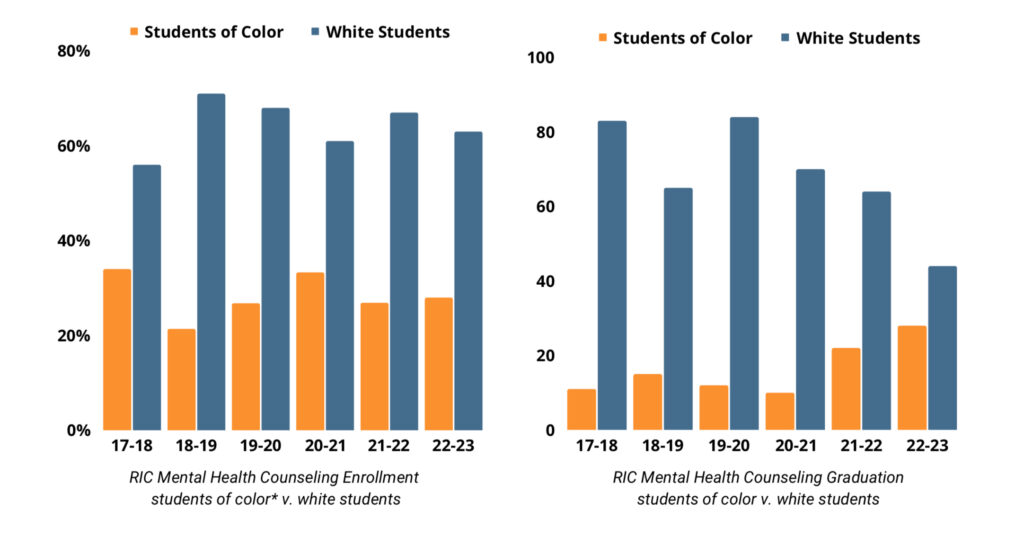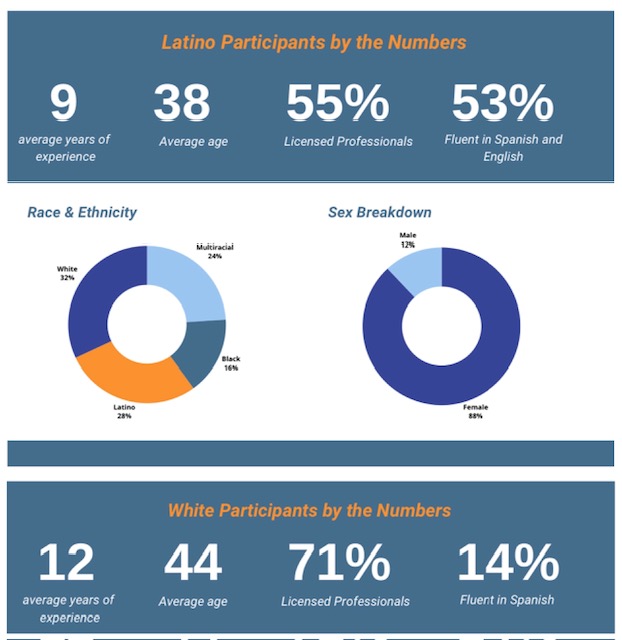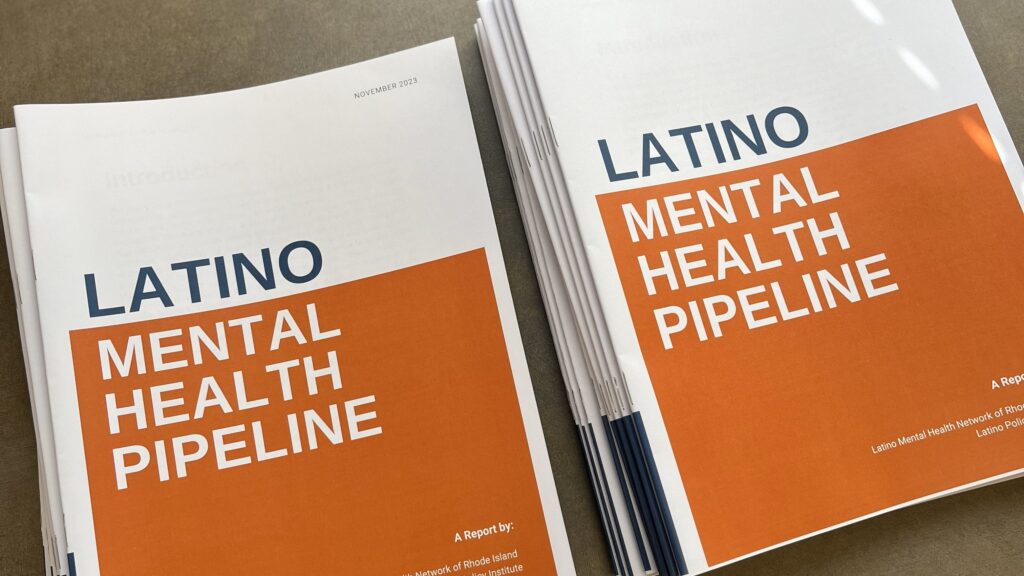Mental health is a critical aspect of overall well-being, yet it remains highly stigmatized and under-addressed in Latino communities. According to the National Survey on Drug Use and Health (NSDUH), Nearly 22% of Hispanic and Latino Americans reported having a mental illness, compared to 23.9% of non-Hispanic Whites, and only 36% of Hispanic and Latino Americans received mental health services compared to non-Hispanic Whites (52%).
Rhode Island’s Latino community faces various mental health challenges, including language barriers, cultural stigma, lack of awareness, and limited access to services. Many Latinos hesitate to seek help due to cultural beliefs, fear of judgment, or lack of understanding about mental health issues. Consequently, mental health disorders often go undiagnosed and untreated, exacerbating the problem within the community.
The Latino Policy Institute, along with the Latino Mental Health Network of RI and Blue Cross & Blue Shield of RI, launched a project to address the challenges faced by Latino and multicultural mental and behavioral health providers.
In 2022, the organizations hosted multiple policy forums, community conversations, and focus groups to discuss the gaps and opportunities in the field while elevating innovative ideas and investment opportunities.
“Unlike many others, this report focused on specifically highlighting the expertise and experiences of Latino and multilingual mental and behavioral health specialists,” Marcela Betancur, Executive Director of the Latino Policy Institute, told RI Latino News about why the Latino Mental Health Pipeline report is vital in best serving Latinos. “For years, we have read reports about the lack of Latinos and other BIPOC professionals in the health field; however, until now, we did not have something that ensured that those that we’re speaking about are part of the conversation and the solution.”
“While Rhode Island has initiated proactive measures to tackle diverse issues in the mental health system, such as the shortage of qualified providers, our focus was on the experiences of Latino, multicultural, and multilingual individuals within the workforce,” reads the report. “Throughout our engagement, recurring themes and concerns consistently emerged from discussions with experts and providers, highlighting obstacles in education, financial accessibility, cultural nuances, and the need for robust professional development support.”
Sandra Victorino and Jennifer Gaviria, Co-Founders of LMHN, said, “All of the issues highlighted have the same merit, and without one, the other is not accomplished; however, financial accessibility, we believe, is critical. In all fairness, we cannot expect someone to go through such a grueling educational program only to come out and face the same social determinants of health as the population they are attempting to support. Many do not understand the impact and the sacrifice it takes to be a provider in two worlds. It is a specialization that our systems depend on that they do not fairly compensate for. When we state compensation, we mean from the insurance companies to the organizations that employ the individuals. Behavioral health is a part of the medical model that helps save lives, supports follow-through with medical services, and decreases hospitalization rates. Yet, the value is not shown, and there are high expectations. Living a healthy life depends on supporting yourself and your family. How can one think about furthering your education when you cannot afford to live, support your family, and would likely need to take on debt?”

Latinos and clinicians of color often began during their experiences in higher
education.” (Slide 6)
Language proficiency and cultural competence significantly impact mental health outcomes. The report emphasizes the importance of providing mental health services in Spanish and ensuring culturally sensitive care to address the unique needs and experiences of Latino individuals.
Focus groups were a cornerstone of the analysis. Betancur said that throughout the year-long project, she was constantly taken aback when the group heard testimony and feedback from Latino clinicians about the emotional toll their work takes on them. “This is due to many variables, but for many, this was due to the large number of patients they were responsible for due to being the only multilingual or Latino clinicians in their job,” said Betancur. “In addition, many clinicians shared the burden of having to be translators and advocates for their clients on top of being their clinicians.”

expansive network of mental and behavioral health professionals and
students, inviting them to participate in a focus group series.” (Slide 8)
The report reveals a significant disparity between the underrepresentation of Latino mental health professionals and the growing Latino population. This discrepancy contributes to the lack of culturally competent care and further hampers access to quality mental health services for Latinos.
“If an organization is employing someone from an underrepresented group, it is their responsibility to be able to show up for the individual just as they expect the individual to show up and do their job. It appears that when it benefits the system, the provider is to act one way; when it does not, the expectation is that their cultural way of being is unacceptable,” said Victorino and Gaviria. “It also shows up through a lack of professional development and succession planning. Those of us from underrepresented groups do not know what we do not know, and if we do not speak up, we are left behind, and if we ask too loudly, we are a problem. Instead of teaching, it becomes a punitive system. The rules have stayed the same, but the demographics have changed. At times, we cannot do the job we are told to do under the rules and policies set for us.”
“With this report, we hope to add a new layer to our state’s conversation around mental health access, workforce development, and investment, “said Betancur. “There is a mental health crisis in our communities, and to better tackle this, we will need to have a workforce of professionals prepared. We hope that with this report, LPI and the LMHN can contribute to the ongoing work and investments in the state.”
The recently released Latino Mental Health Pipeline report is a groundbreaking report shedding light on the critical state of mental health within the Rhode Island Latino community. This comprehensive analysis serves as a wake-up call for policymakers, healthcare professionals, and society as a whole to address the pressing mental health needs of Latinos.
Publisher’s Notes: LPI and Rhode Island Latino News are partners in elevating the visibility and voices of Rhode Island’s Hispanic-Latino communities.




